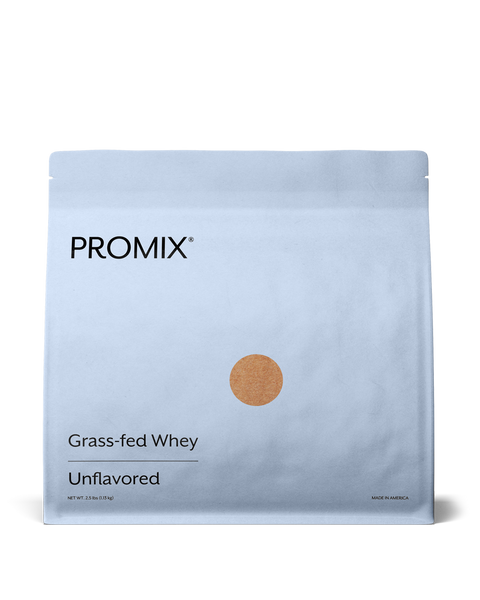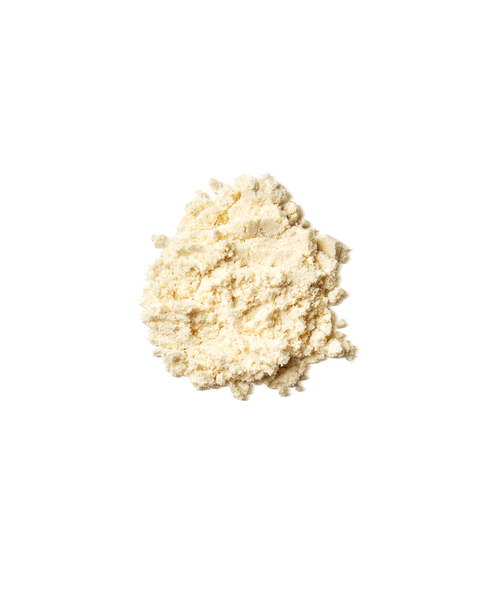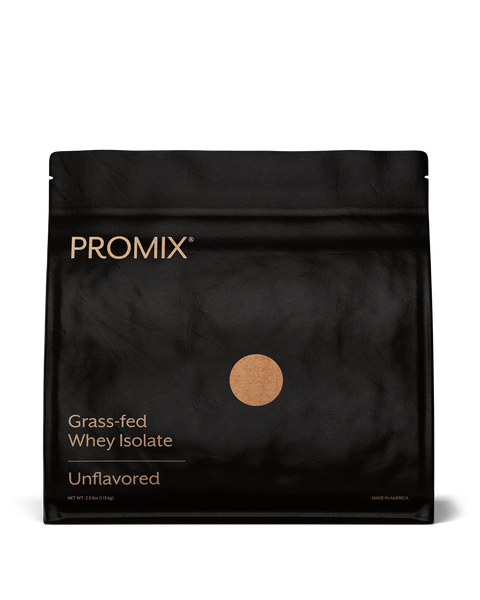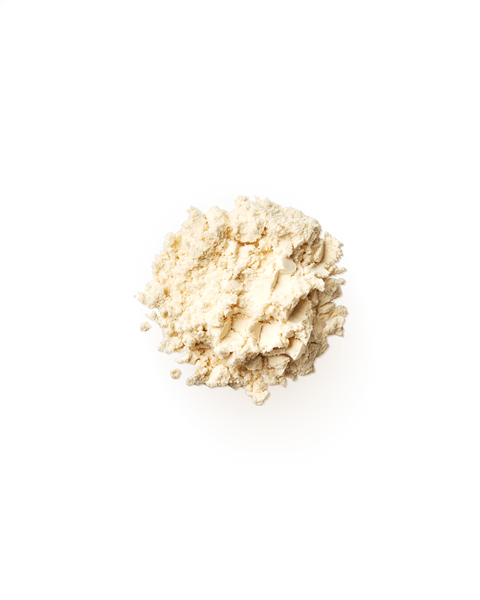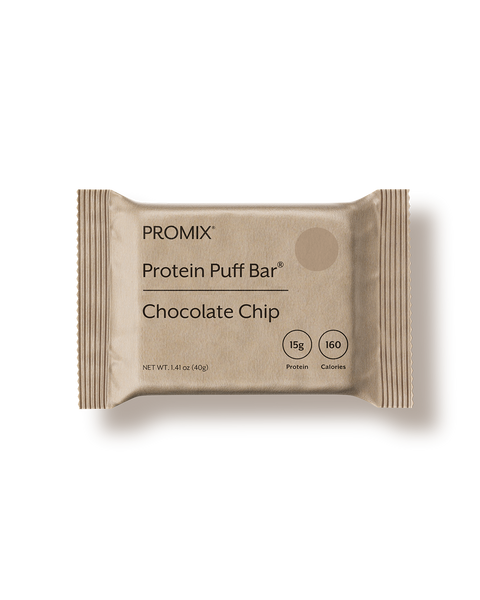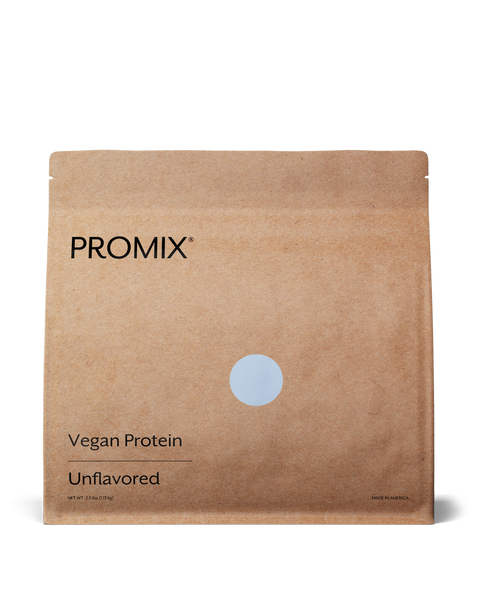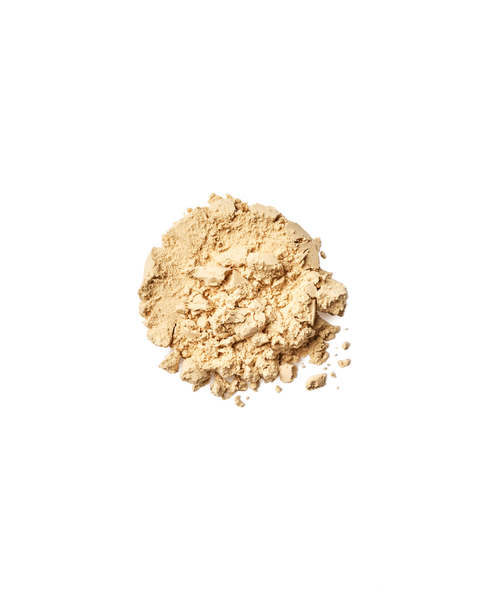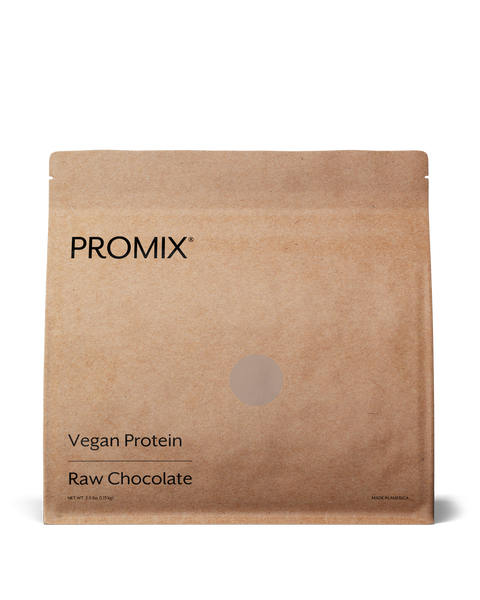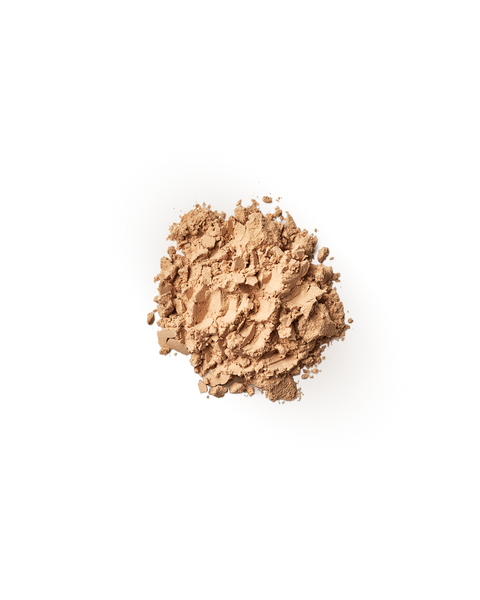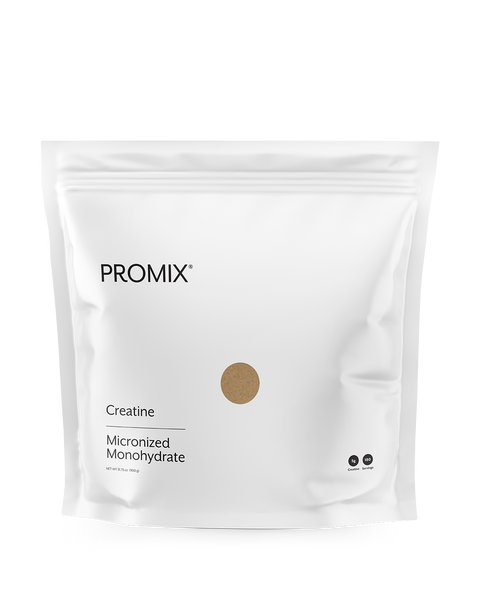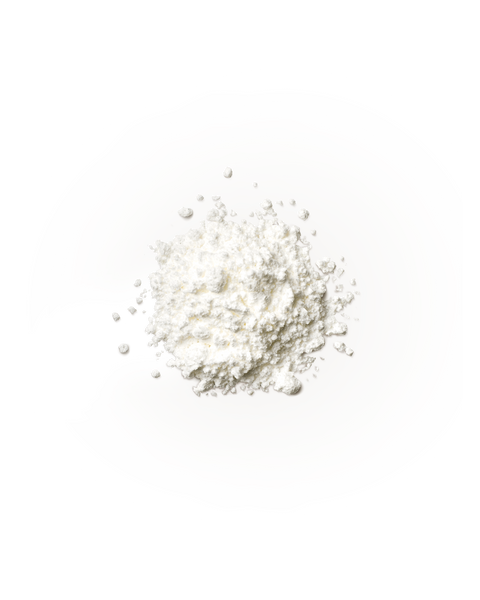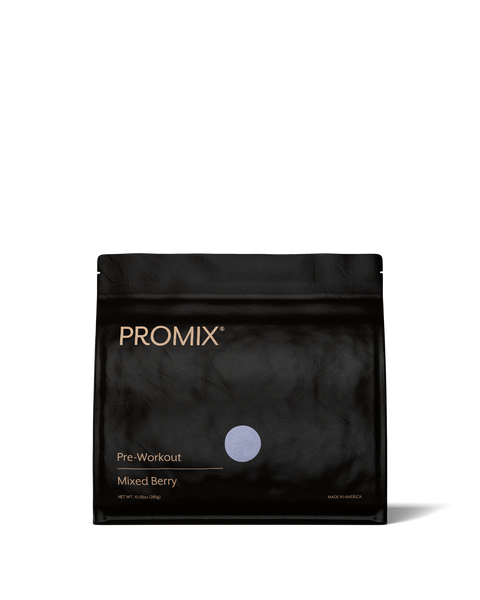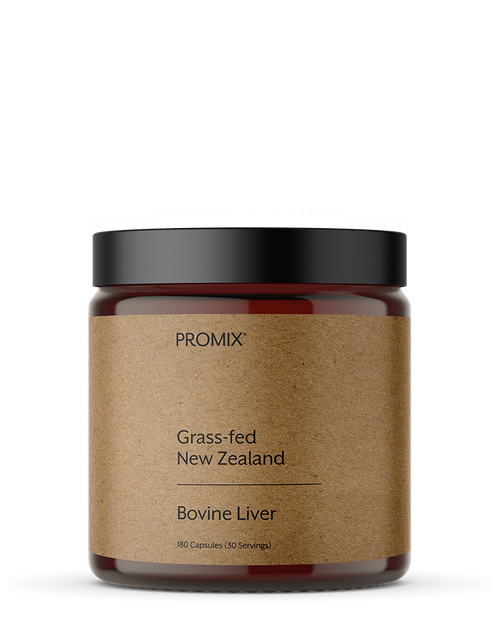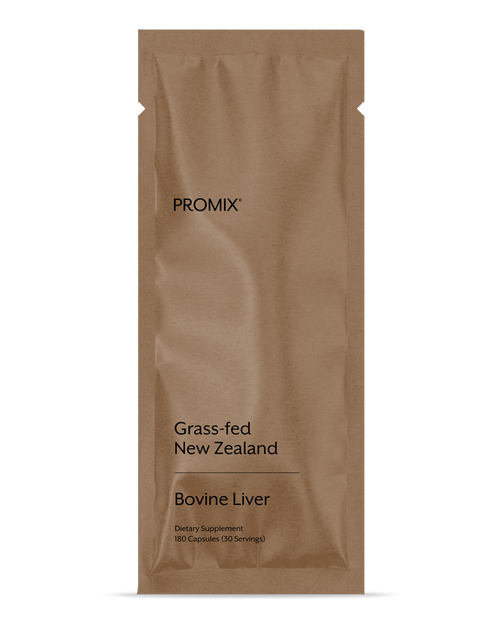
What is the Promix Protein Calculator™?
The Promix Protein Calculator™ provides you with a tailored response to your question, “How much protein do I need in a day?” Our Promix Protein Intake Calculator helps you optimize your nutrient consumption within your daily routine. Whatever your goals, our protein intake calculator will guide you toward the ideal amount of protein and provide valuable information about how to train. Our protein intake calculator not only does the math for you, it guides you toward the right natural protein powder and natural nutritional supplements to fit your preferences and lifestyle for maximal results.
What Makes the Promix Protein Calculator™ Unique?
The Promix Protein Calculator™ was designed by Albert Matheny, M.S., R.D., C.S.C.S. Albert is a Registered Dietitian, Exercise Physiologist, and Founder + Owner of SoHo Strength Lab in New York City (Men’s Health "Best New Independent Gym" 2015). For the past ten years, Albert has worked with athletes and clients of all ability levels to improve their nutrition and training.
Who Should Use the Promix Protein Calculator™?
The Promix Protein Calculator™ is for anyone looking for a better way to determine their own specific daily protein needs quickly and easily. Our protein calculator combines well-researched scientific components with the years of real world experience Albert has gained through helping thousands of clients. Whether you are an Olympic gold medalist or someone just starting to train, having the right amount of protein in your diet will help you feel better and achieve your goals.
How to Use Our Protein Calculator?
Our Promix Protein Calculator™ is designed to work for someone that is new to training and for the experienced/elite athlete. Choose the path of questions that is appropriate for you and answer the questions truthfully to give the most accurate protein recommendation. Individual data is never shared or published.
What are the Next Steps After Using Our Protein Calculator?
After completing the protein calculator you should look at your total protein needs, as well as the maximum recommended daily protein in the form of supplements. Whole foods (e.g. eggs, legumes, meats, nuts...) should always make up the majority of your protein intake regardless of your goals.
How does the Promix Protein Calculator™ calculate your specific protein intake?
The Promix Protein Calculator™ calculates your specific protein intake by taking data into account into three key areas that determine your protein needs. These areas are physical attributes ( e.g. height, body type....), past training history and current training level (e.g. how many days/week you strength train), and future physical goals (e.g. primary training goal).
- Your physical attribute data is used to get an approximation of your lean body mass. Lean body mass allows for a baseline calculation of your daily caloric expenditure, including protein needs.
- Past and current training level data allows for an assessment of your protein needs based upon your training. This data also gives a better indication of where you are in your training, e.g. a beginner who can be expected to see fast and significant adaptations, an experienced lifter that is progressing over a longer timeline, etc.
- Lastly, using your future physical goals, the algorithm is able to determine how your protein needs will be changing from you today moving forward. For example, are you making a significant change to your training or nutrition, primarily staying on the same training and nutrition plan, etc.
The data from these three areas allows the Promix Protein Calculator™ to consider all aspects impacting your protein needs and make a specific recommendation aimed to help you feel, perform, and recover optimally.
The 411 on Protein Intake
We receive a lot of questions about protein, and for good reason–protein intake can be really confusing! Promix has the answers you need to successfully adjust your protein intake based on your needs. Here are a few basic points everyone should know about protein:
1. What are Proteins?
Proteins are large and complex molecules made up of amino acids and constructed into long chains. Protein is responsible for a number of bodily functions, from tissue growth and maintenance, aiding in digestion, muscle contraction, energy production, and blood clotting. Proteins also contribute to:
- Building structure within cells
- Regulating pH and fluid balance
- The transportation and storage of nutrients
- Assisting in the communication of cells, tissues, and organs
2. Why Protein is Essential to Your Diet?
In addition to carbohydrates and essential fats, protein is a macronutrient required by the body in order to perform basic functions. When there is not enough protein in your diet, you may experience weakness, fatigue, swelling, skin degeneration, loss of muscle mass, and an increased risk of injury.
3. How Much Protein Do I Need in a Day?
The following chart reveals the recommended daily protein intake based on your age given that you are overall healthy.

It is important to note that the FDA’s recommended daily values are to prevent deficiency and not based on optimal health nor specific to individuals, especially those looking to gain lean muscle or improve their body composition. The recommended daily allowance (RDA) of protein varies from one person to the next.
To get your specific daily protein intake needs, get started with our simple and free protein calculator:
-
General Fitness Promix Protein Calculator™ - Best for people who go to the gym a few times per week and enjoy a variety of workout types or classes.
-
Experienced Lifter Promix Protein Calculator™ - Best for people who go to the gym 3x/week or more and have specific strength or performance goals.
4. What is the RDA of protein for muscle growth?
1g/lb (2.2g/kg) of body weight is recommended for someone who is training at least 1 hour per day and whose goal is to gain muscle. It’s rare for people to hit this goal because of the reality of how people adhere to nutritional guidance. Simply trying to hit this goal brings protein intake up and this significantly improves lean muscle gain, recovery, and overall body composition (e.g. increased lean mass and decreased fat mass).
5. What are the Benefits to Eating Protein?
As a macronutrient, protein is vital to your body’s natural processes. When you supplement your diet with the right amount of protein, you are making it easier for your body to build lean muscle, strengthen bones and tissue, deliver oxygen and nutrients throughout the body, aid in digestion, and regulate hormones. Furthermore, eating protein can help curb hunger, maintain a healthy weight, reduce fatigue, and reduce recovery time after exercise or injury.
6. What Happens if You Have Too Much Protein?
Just like having too little protein in your diet can lead to serious health problems, eating too much protein for a long time can cause exhaustion and discomfort, including indigestion, dehydration, nausea, irritability, diarrhea, headaches, and put you at an increased risk for developing kidney stones.
Knowing the answer to ‘How much protein do I need” can help you avoid eating too much protein, and subsequently suffering from discomfort or medical problems.
7. Which Foods are High in Protein?
Foods high in protein include:
- Lean meats (beef, lamb, veal, pork)
- Dairy products
- Poultry
- Fish and seafood
- Eggs
- Nuts and seeds
- Legumes and beans
For amounts of protein in common foods, please refer to the USDA’s Nutrient Database for protein.
8. How Much Protein Should I Consume From Supplements?
Regardless of your protein needs, it is important to remember that the majority of your food should come from whole food sources like meats, eggs, nuts, etc., not from supplements. Supplements should be used when you need a convenient source of protein and generally, should not make up more than 35% of your daily protein intake.
For example, if 160 grams of protein is your daily intake, then no more than 56 grams should come from protein supplements (160 x .35 = 56). When you are pressed for time, a protein shake is the best option for you, but remember that whole foods are your first choice whenever possible.
9. Why is the Recommended Daily Value for Protein Not the Best for Health and Performance?
The Daily Value (DV) is a term created by the FDA that replaced the term "US RDA".
"US" stands for United States. RDA stands for "Recommended Daily Allowances".
The RDA for protein is calculated by multiplying the EAR (Estimated Average Requirements) by 1.2.
(RDA = 1.2 x EAR)
So what is the EAR for protein based upon?
The EAR is based on what scientific research has said will be enough to "satisfy the needs of 50% of the people in that age group." In other words, this means that half of that group will be deficient and half will have enough protein to avoid any negative effects on health. This is also not considering an athletic population that already needs more protein. This is simply an average population sample. Furthermore, I am not looking to only recommend the bare minimum (or below) to prevent disease. I am also looking for the amount to recommend that will fully maximize health, longevity, and physical performance.
So, to put this all together, the Daily Value you see on food labels for protein is equal to 20% more than what half of the average, non-athletic population needs to prevent deficiency and negative health effects. This is crazy!
The takeaway here is that the Daily Value for protein is INCREDIBLY LOW for what is actually needed for an athlete, not to mention for someone whose goal is to add lean muscle. The Daily Value is not even enough for someone who works out a few times per week.
FUN FACT: Until 2020, the Nutrition Facts label that shows the Daily Values on your food and supplements will still be based on research that the FDA used to establish RDAs over fifty years ago (in 1968, to be exact). What we know about nutrition has changed in the last fifty years, wouldn’t you say?
Notes About Using the Promix Protein Calculator™
No protein calculator is perfect without taking physical measurements. For the most accurate representation of your daily protein needs, it is helpful to first determine your lean body mass (LBM) using either a Dexa Scan or Bioelectrical Impedance Scale. After you have your lean body mass, you can evaluate your training and lifestyle to achieve a more exact determination of your protein needs. If you would like an in-depth analysis and recommendations, contact Albert. For anyone other than elite athletes, this level of detail is not necessary, nor will it yield significantly better end results in relation to your training goals.
Your Privacy is Important to Us
The information you input is for your own personal use and will not be published or reproduced.
Disclaimer:
The Promix Nutrition Protein Calculator (TM) is for education purposes only. Please consult your dietitian and doctor before beginning any new diet or exercise program.
These statements have not been evaluated by the Food and Drug Administration. This product is not intended to diagnose, treat, cure, or prevent any disease.
References:
Peterson, Courtney & Thomas, Diana & L Blackburn, George & Heymsfield, Steven. (2016). Universal equation for estimating ideal body weight and body weight at any BMI. American Journal of Clinical Nutrition. 103. 10.3945/ajcn.115.121178.
Institute of Medicine (US) Food and Nutrition Board. Dietary Reference Intakes: A Risk Assessment Model for Establishing Upper Intake Levels for Nutrients. Washington (DC): National Academies Press (US); 1998. What are Dietary Reference Intakes? Available from: https://www.ncbi.nlm.nih.gov/books/NBK45182/
Institute of Medicine (2010). "2 History of Nutrition Labeling". Front-of-Package Nutrition Rating Systems and Symbols: Phase I Report. The National Academies Press.
Encyclopedia of Food Sciences and Nutrition (Second Edition) 2003, Pages 1863-1868
(EUFIC, 2019) https://www.eufic.org/en/whats-in-food/article/what-are-proteins-and-what-is-their-function-in-the-body
(Healthline, 2018) https://www.healthline.com/nutrition/functions-of-protein#TOC_TITLE_HDR_2
(Healthline, 2017) https://www.healthline.com/nutrition/protein-deficiency-symptoms#TOC_TITLE_HDR_12
(Piedmont) https://www.piedmont.org/living-better/why-is-protein-important-in-your-diet
(Medical News Today, 2018) https://www.medicalnewstoday.com/articles/322825
(Harvard Medical School, 2020) https://www.health.harvard.edu/nutrition/when-it-comes-to-protein-how-much-is-too-much
Jäger, R., Kerksick, C. M., Campbell, B. I., Cribb, P. J., Wells, S. D., Skwiat, T. M., Purpura, M., Ziegenfuss, T. N., Ferrando, A. A., Arent, S. M., Smith-Ryan, A. E., Stout, J. R., Arciero, P. J., Ormsbee, M. J., Taylor, L. W., Wilborn, C. D., Kalman, D. S., Kreider, R. B., Willoughby, D. S., Hoffman, J. R., … Antonio, J. (2017). International Society of Sports Nutrition Position Stand: protein and exercise. Journal of the International Society of Sports Nutrition, 14, 20. https://doi.org/10.1186/s12970-017-0177-8
Antonio, J., Ellerbroek, A., Silver, T., Orris, S., Scheiner, M., Gonzalez, A., & Peacock, C. A. (2015). A high protein diet (3.4 g/kg/d) combined with a heavy resistance training program improves body composition in healthy trained men and women--a follow-up investigation. Journal of the International Society of Sports Nutrition, 12, 39. https://doi.org/10.1186/s12970-015-0100-0
Promix Protein Calculator ™
General Fitness Protein Calculator
Best For: You go to the gym a few times per week and enjoy a variety of workout types or classes.
Start CalculatorExperienced Lifter Protein Calculator
Best For: You go to the gym 3x/week or more and have specific strength or performance goals.
Start CalculatorAre You a Male or Female?
How Many Workouts Do You Do Each Week? 1 workout is equal to 45 minutes, not including light warm-up or cool down, of moderate or high intensity strength or cardiovascular training
Do You Have Any Dietary Restrictions?
Are You a Male or Female?
How Many Workouts Do You Do Each Week? 1 workout is equal to 45 minutes, not including light warm-up or cool down, of moderate or high intensity strength or cardiovascular training
Do You Have Any Dietary Restrictions?
Results Calculated (please record results, data is not saved)
How much protein you should have on average per day
Maximum amount of protein from supplements per day
It is important to remember that not every day is the same. Some days, you will need more protein than others. These numbers are an average estimate of your specific daily needs. For example, on a day where you watch a lot of Netflix, you will likely need less protein than on a day you workout, go for a hike, work on the yard, etc. The difference in protein intake between days you work out and days you don’t can often be met with a protein shake immediately after your workout.
Protein Supplements Recommended For You
Protein Supplements Recommended For You
Protein Supplements Recommended For You
Protein Supplements Recommended For You
It is important to discuss with your doctor and dietitian your protein intake levels from your diet and/or supplements prior to using any products.
Please email albert@promixnutrition.com if you need more information.

